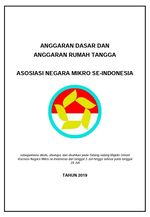Charter of the Association of Indonesian Micronations
| Charter and By-Laws of the Association of Indonesian Micronations | |
 Cover page of the amended Charter
| |
| Created | 2014 |
| Ratified | 28 January 2015 (Original) 29 July 2019 (2019 Amendment) |
| Authors | Tommy N. |
| Signers | Member states of AIM |
| Purpose | Constitution of the AIM |
Charter and By-Laws of the Association of Indonesian Micronations (Indonesian: Anggaran Dasar dan Anggaran Rumah Tangga Asosiasi Negara Mikro se-Indonesia) is the current constitutional basis of the Association of Indonesian Micronations. The Charter was ratified in January 2015 after a process of composition involving all member states, with Tommy N. of Harjakarta as the chairman of the commission.
The charter has been amended for multiple times. The first amendment was occurred on 29 July 2019 under the chairmanship of Excellent, on when the charter was heavily amended to remove outdated articles and add new consensus adopted by the organisation. The second amendment was passed on 10 April 2020, involved only changes on two articles.
In line with Indonesian organisational lawmaking tradition, it consists of two separate documents (Anggaran Dasar and Anggaran Rumah Tangga) that is treated as one continuous law. While the Anggaran Dasar provides the summary constitutional basis, the Anggaran Rumah Tangga provides explanations and a more detailed legislation from clauses on the Anggaran Dasar.
Background
For its early years, Association of Indonesian Micronations does not have any basis of governance except its establishment charter that was signed by founding members Indokistan and Los Bay Petros in 2011. Secretary General Adriansyah Yassin Sulaeman insistence on informal nature of AIM also prevented any move to compose such constitutional text.
A new movement to compose a Charter was initiated by secretary general Tommy N. in January 2015, with himself preside over the commission to compose the draft, that was concluded in a merely 2 weeks. After the draft was published to the General Assembly, it was hastily ratified by member states that was enthusiastic on having a charter to become their basis of activities inside the AIM.
During stagnation of AIM after the dissolution of Indokistan in 2016, the organisation was criticised because of its failure to renew the charter to fit the current situation. Activities and institutions of AIM has been severely deviated from the Charter, simply because of lack of personnel to run the organisation properly as dictated on it. Failure to meet quorum also prevented any action to amend the Charter.
After revival of activities in 2019, calls to amend the charter was again reconsidered by member states. After accession of Excellent as Chairman of AIM, one of his main program was to amend the Charter. The process to amend the Charter was successfully started on 3 July 2019. Amendment of the Charter was completed on 20 July 2019, while the By-laws followed suit in 29 July, which concludes the entire amendment process. The amended charter was ratified on the same day.
The second amendment was passed on 10 April 2020. This minor alteration on the charter involved changes on term office and observership period.
Contents
Charter
The main Charter body (Anggaran Dasar) contains 8 chapters and 16 articles, and is the constitutional basis of the organisation. The main Charter dictates the organisational form, common principles, and characteristics. Furthermore, the Charter dictates status of membership and institutions inside AIM. It also manages mechanism of organisational funding. The Charter also set an easy amendment process, with a mere simple majority necessary to pass any amendment.
The main Charter dictates the AIM as a fraternal community of micronations inside Indonesian sector, while also commits to the values of Indonesian national ideology Pancasila and commitment to not to separate from Indonesia. It also mentions Full membership and Observership status, and also five official institutions of AIM (Chairman, Secretary General, General Assembly, General Secretariat, and High Court). The organisation does not charge membership fee, but allows donation and request for funding in exceptional cases and events.
By-Laws
The By-Laws (Anggaran Rumah Tangga) contains 8 chapters and 18 articles. The by-laws mainly deals with organisational procedures, and also provides details of regulations from clauses described on the Charter. The By-Laws includes conditions of membership, rights and obligations of member states, authority of institutions, appointment of officers, and clauses on longevity of the organisation and possibility of disbandment.